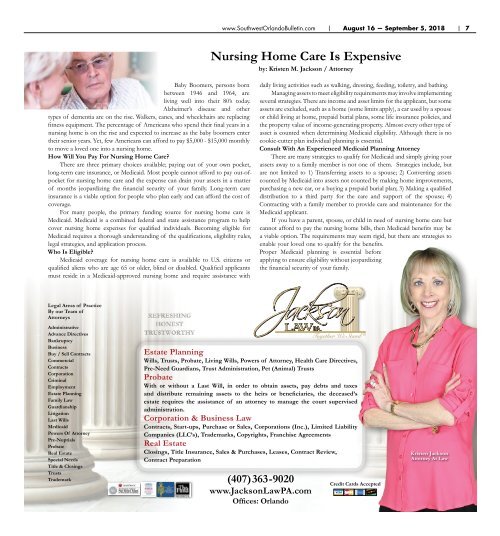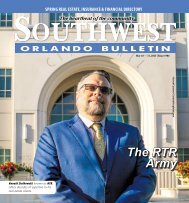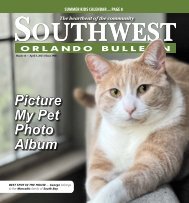You also want an ePaper? Increase the reach of your titles
YUMPU automatically turns print PDFs into web optimized ePapers that Google loves.
www.SouthwestOrlandoBulletin.com x August 16 — September 5, 2018 x 7<br />
Nursing Home Care Is Expensive<br />
by: Kristen M. Jackson / Attorney<br />
Baby Boomers, persons born<br />
between 1946 and 1964, are<br />
living well into their 80’s today.<br />
Alzheimer’s disease and other<br />
types of dementia are on the rise. Walkers, canes, and wheelchairs are replacing<br />
fitness equipment. The percentage of Americans who spend their final years in a<br />
nursing home is on the rise and expected to increase as the baby boomers enter<br />
their senior years. Yet, few Americans can afford to pay $5,000 - $15,000 monthly<br />
to move a loved one into a nursing home.<br />
How Will You Pay For Nursing Home Care?<br />
There are three primary choices available; paying out of your own pocket,<br />
long-term care insurance, or Medicaid. Most people cannot afford to pay out-ofpocket<br />
for nursing home care and the expense can drain your assets in a matter<br />
of months jeopardizing the financial security of your family. Long-term care<br />
insurance is a viable option for people who plan early and can afford the cost of<br />
coverage.<br />
For many people, the primary funding source for nursing home care is<br />
Medicaid. Medicaid is a combined federal and state assistance program to help<br />
cover nursing home expenses for qualified individuals. Becoming eligible for<br />
Medicaid requires a thorough understanding of the qualifications, eligibility rules,<br />
legal strategies, and application process.<br />
Who Is Eligible?<br />
Medicaid coverage for nursing home care is available to U.S. citizens or<br />
qualified aliens who are age 65 or older, blind or disabled. Qualified applicants<br />
must reside in a Medicaid-approved nursing home and require assistance with<br />
daily living activities such as walking, dressing, feeding, toiletry, and bathing.<br />
Managing assets to meet eligibility requirements may involve implementing<br />
several strategies. There are income and asset limits for the applicant, but some<br />
assets are excluded, such as a home (some limits apply), a car used by a spouse<br />
or child living at home, prepaid burial plans, some life insurance policies, and<br />
the property value of income-generating property. Almost every other type of<br />
asset is counted when determining Medicaid eligibility. Although there is no<br />
cookie-cutter plan individual planning is essential.<br />
Consult With An Experienced Medicaid Planning Attorney<br />
There are many strategies to qualify for Medicaid and simply giving your<br />
assets away to a family member is not one of them. Strategies include, but<br />
are not limited to 1) Transferring assets to a spouse; 2) Converting assets<br />
counted by Medicaid into assets not counted by making home improvements,<br />
purchasing a new car, or a buying a prepaid burial plan; 3) Making a qualified<br />
distribution to a third party for the care and support of the spouse; 4)<br />
Contracting with a family member to provide care and maintenance for the<br />
Medicaid applicant.<br />
If you have a parent, spouse, or child in need of nursing home care but<br />
cannot afford to pay the nursing home bills, then Medicaid benefits may be<br />
a viable option. The requirements may seem rigid, but there are strategies to<br />
enable your loved one to qualify for the benefits.<br />
Proper Medicaid planning is essential before<br />
applying to ensure eligibility without jeopardizing<br />
the financial security of your family.<br />
Legal Areas of Practice<br />
By our Team of<br />
Attorneys<br />
Administrative<br />
Advance Directives<br />
Bankruptcy<br />
Business<br />
Buy / Sell Contracts<br />
Commercial<br />
Contracts<br />
Corporation<br />
Criminal<br />
Employment<br />
Estate Planning<br />
Family Law<br />
Guardianship<br />
Litigation<br />
Last Wills<br />
Medicaid<br />
Powers Of Attorney<br />
Pre-Nuptials<br />
Probate<br />
Real Estate<br />
Special Needs<br />
Title & Closings<br />
Trusts<br />
Trademark<br />
Estate Planning<br />
Wills, Trusts, Probate, Living Wills, Powers of Attorney, Health Care Directives,<br />
Pre-Need Guardians, Trust Administration, Pet (Animal) Trusts<br />
Probate<br />
With or without a Last Will, in order to obtain assets, pay debts and taxes<br />
and distribute remaining assets to the heirs or beneficiaries, the deceased’s<br />
estate requires the assistance of an attorney to manage the court supervised<br />
administration.<br />
Corporation & Business Law<br />
Contracts, Start-ups, Purchase or Sales, Corporations (Inc.), Limited Liability<br />
Companies (LLC’s), Trademarks, Copyrights, Franchise Agreements<br />
Real Estate<br />
Closings, Title Insurance, Sales & Purchases, Leases, Contract Review,<br />
Contract Preparation<br />
(407)363-9020<br />
www.JacksonLawPA.com<br />
Offices: Orlando<br />
Credit Cards Accepted<br />
Kristen Jackson<br />
Attorney At Law

















